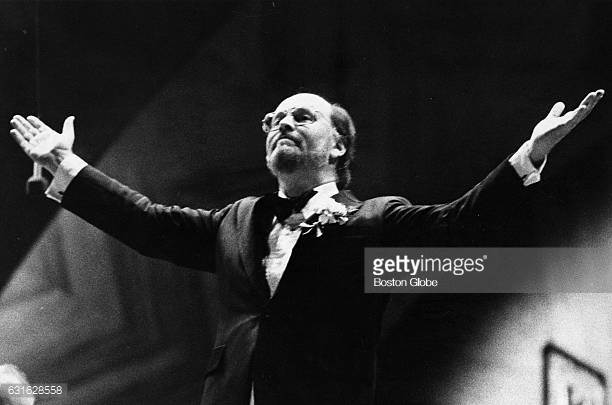- Popular Post
-
Posts
4,765 -
Joined
-
Days Won
6
Posts posted by SteveMc
-
-
Listened to the piece again this morning, with the video of the concert now.
Firstly, it is beyond impressive that JW, 89 years of age, took on the task of writing and conducting a piece of this magnitude, looking absolutely fabulous while doing it.
Prologue is still a bit of a tough nut for me to crack, and I suspect the orchestra might have found it so as well. I get the impression of almost competing dramatic threads and climaxes, though the heart of the movement seems to be the cadenza, where Mutter is brilliant.
Rounds has a bit more of a fulfilling structural and musical intent, with some really sparkling moments of orchestration.
Dactyls stood out this time to me, and I think it might be my favorite movement. I think it is actually quite visual, drawing a sense of tension and drama not only from the sound of the orchestra/soloist interplay, but from the sight of the forces playing off each other. This is a movement meant to be performed. I must say, I was impressed.
Epilogue has some lovely writing in it, but I still need to listen to it further I think.
Overall, the concerto is very demanding, not only for soloist but for the orchestra as well. From my perspective as listener, I feel as if the work is lacking a little bit in structure, where the passages sometimes do not point to a definite direction either within movements or within the piece as a whole, instead giving the impression of a stroll through sonic moods and experimentation. I found this to be a bit of a let down compared to recent works like Markings and Highwood's Ghost which struck me as exhibiting a remarkable growth in Williams's approach to structural purpose. I could not help but compare the piece to John's first Violin Concerto as well. While the new work certainly exhibits a more advanced grasp of compositional technique, the first concerto has an emotional core that gives it a definite sense of internal musical vision, at least to my sensibilities.
But, something else struck me about the new Violin Concerto No. 2, and that is that the overall structure for the piece perhaps is designed to come not entirely from inside the work, but from outside, that part of the challenge Williams baked into the work is for the soloist and, especially, the orchestra to have to find and convey their own direction and purpose as they interpret the music. If that is truly the case, then I look forward with great interest to future performances and the possible upcoming recording, where Mutter will have more familiarity with the work and JW will have more time to fully convey his vision for it.
-
I remember being entranced with the Violin Concerto No.1 on my first listen to it, so a bit of a different thing for me than some of y'all where I'm going to need to warm to this one.
There did seem to be some call backs to the first concerto as mentioned above, in the first and second movements particularly.
-
1 hour ago, Will said:
Well, I really liked Rounds! Not such a huge fan of Prologue, though. I'm reserving judgment on the other two movements until I hear them more.
Rounds was the highlight, yes. Prologue was a bit heavy and serious, perhaps straining a tad under its own weight. It was quite different from what I expected. There were interesting moments of flair and intensity though.
The final movements tended to blur together in my mind. Perhaps that's just my mind, this being relatively challenging music (although I am in no way adverse to challenging music). But I still felt that perhaps those movements, and the piece in general, could have had some more overt motifs to help to anchor it.
Honestly, I was expecting something just a little more lyrical, not necessarily romantic, but something more overt in terms of melodic element and more tight in terms of structure. Perhaps those expectations affected my initial response to an excessive degree, although certainly I was more comparing the piece to JWs first Violin Concerto and Markings than his film style.
Watching the video tomorrow should give me a more clear and accurate set of impressions.
-
Listening on WCRB. It begins!!
-
-
13 hours ago, Matt S. said:
I’m listening to this recording right now… it’s probably my favorite of the ones I’ve heard. I still need to check out the Detroit recording.
Though to be honest, I prefer this concerto to be played by a bass trombone. Charles Vernon has recorded it with piano reduction, and former Boston Pops bass trombonist Douglas Yeo performed with John Williams himself back in the day.
I think I prefer that arrangement more as well.
-
5 hours ago, Miguel Andrade said:
Nulty with the DSO is not one of my favorites. Much more a fan of the Pokorny performance.
And if I may, here's a performance very dear to my heart, if for nothing else, because I was actually there and could feel the eletricity and excitement in the air. This and the performance given a couple of days later, where the last concerts I attended before the pandemic shutdown, which in a way, makes those performances even more dear to me.
What do you think of the Baadvisk recording? Williams is quoted as having some appreciation of it.
-
Tuba Concerto (1985)
Composed to celebrate the anniversary of the Boston Pops orchestra's founding in 1885, the Concerto for Tuba and Orchestra is perhaps the most filmic of Williams's concerti. The long-lined development of themes and free flowing structure gives it an airy underscore-like quality that makes it readily listenable, even though I've generally found it to also be not quite as engaging as my taste would like. Nevertheless, it is a fine showcase for a tubist, something attested to by the large number of recordings that have been made of the work.
The work has the tuba move through various moods with the orchestra, a certain stately pompousness in the first movement, mystery and song in the second, and joy and motion in the third.
Leonard Slatkin's Detroit Symphony interpretation with Dennis Nulty as soloist is my preferred one, having a bit more motion in it than some others.
Here it is:
SpoilerThis audio of a 1988 live performance with the St. Louis symphony is synced to the sheet music.
Spoiler -
-
The Mission (1985)
As a little bonus (I'm not going to include it in the "official" list of concert works), here is The Mission.
This is essentially a Suite for Orchestra in four movements, and I think it would be nice if it were published in its entirety for concert performance.
It contains some very adroit writing, drawing on Williams's film sound but in a very neatly structured way. The outer movements have the most identifiable hooks and presence, but the somewhat more complex inner movements are just as interesting to me.
EDIT: I'm going to include it in the main post list after all, but not in bold.
-
This was one of the first pieces I heard when I really started to dive deep into John's music, so it holds a special place.
I was quite stunned when I heard it for the first time.
-
Olympic Fanfare and Theme (1984)
One the most enduring and recognizable of all of Williams's music for film or concert, The Olympic Fanfare and Theme is a extremely rousing concert overture written to open the 1984 Los Angeles Summer Olympic Games. Williams sought to capture the human striving inherent in the Olympic spirit, and the powerful moment when the fanfare theme and the lyrical theme come together especially accomplishes this magnificently.
The piece was premiered in concert with the Boston Pops in June, before it was performed at the event for which it was commissioned in July. As well, Michael Tilson Thomas conducted it around this time in a concert that was recorded for radio broadcast.
Williams made an official recording of the piece in Los Angeles, which this video purport to have.
SpoilerHere is the piece being performed at the opening ceremonies.
SpoilerHere is a Boston Pops recording, I believe from the 1987 By Request album.
SpoilerIn 1996, Williams recorded a new version of the work that was commissioned by NBC to feature Leo Arnaud's Bugler's Dream, which Williams included at the start of the piece, replacing the opening herald fanfare.
SpoilerFinally, here is a recent live recording of the piece (slightly modified in orchestration I think) with Dudamel leading the Los Angeles Philharmonic, with the original opening restored.
Spoiler -
Maybe it does if you coat it in aerogel
-

The Truman Show
Remarkable piece of work from Peter Weir. Weir crafts a world and a visual style around Carrey's persona and acting style, with Carrey keeping things just Jim Carrey enough, bringing out a really moving dramatic performance. The film's visual style befits the story. It is rooted in a "Hollywood" approach, but just off enough to get the viewer just a bit uneasy. The story's humor and concept allow it to play out as a great piece of entertainment. The details and themes allow it to play out as a provoking work of literary art. It is a send up of the artificiality and control of consumerism. But also a somber warning about the dangers of control in the name of striving towards utopia. It is a celebration of the pursuit of life and expresses uncertainty about the afterlife. It questions the motives and mechanisms of organized religion, while expressing a triumph of a true faith. It has a happy ending that is undeniably tragic. Christof is not entirely wrong. The world outside the dome is not more real than the one inside. Truman has become a true man, because now he must live knowing that reality fully. But kind of man will Truman become exactly? How can you avoid bitterness and alienation in a world that had you live a false life for their viewing pleasure? We don't have that answer for sure. We hope he will still find love and faith things worth living for in the "real" world just as they were for him on his life's stage. But we don't know. It is left up for us to answer that in our own lives.
4/4
-
- Popular Post
Esplanade Overture(1983)
We continue now with a "comedic" concert overture that Williams wrote for the Boston Pops sometime in 1982, which was premiered in 1983, after he had repurposed some of the material for his score to Monsignor .
The piece is another showcase for orchestra that blends some of Williams's concert sensibilities with the lyrical and rhythmic hallmarks of his film work, leaning a bit more on the latter. There are two central themes, a choppier scherzo type motif, and a lyrical theme that calls to mind The Mission a couple of years ahead.
It is an interesting piece, one which hopefully will be recorded in the future.
The only audio we have is apparently taken from a Boston Pops radio broadcast.
Here it is:
-
8 hours ago, Thor said:
Same here, I'm afraid. Hokey patriotism that sounds like it's straight out of a Republican convention.
Without moving too much into politics here, I think the piece's lyrical problem is not simplistic patriotism. Something like Lee Greenberg's "God Bless The USA" is an example of a very simple almost surface type patriotism that in its own way works since it has an authentic element, reflecting and amplifying the feelings that ordinary folk can have, regardless of the merit of those feelings.
"America, The Dream Goes On" feels like a sort of artificial overwrought attempt at this sort of simple patriotism.
This stanza in particular I think is suspect.
There's a song in the dust of a county road
on the wind it comes to call,
and it sings in the farms and the fac'try towns
where you think there'd be no song at all.It feels just a little bit snobbish and elitist to assume that you'd think there would be no song in places like that. You feel confused about what they mean by song too. Patriotism? Hope? Happiness? Why do the lyrics insist we would think these places would not have these kind of basic human feelings?
Essentially, the lyrics feel they are more clever than they really are and want you to think they are clever. Those sort of things seldom work well.
-
-
- Popular Post
I think it just fully hit me this morning and I am a bit in shock and awe.
John Williams is doing another Indiana Jones score.
Just remarkable.
- Madmartigan JC, Not Mr. Big, Andy and 1 other
-
 3
3
-
 1
1
-
America, The Dream Goes On (1982)
Part of me had doubts about including this piece in here, since it seems to exist more as a pop-light music fusion occasion piece than as a proper classical concert work.
At any rate, it is a blissfully patriotic piece, a product of the burgeoning Reagan era optimism and neo- Americana (which Williams would be a more formal part of later). The lyrics, by Alan and Merilyn Bergman are about as far from nuance and cleverness as you can get. There are some interesting little moments in the orchestration, but overall I am not a big fan of this piece.
Here's the original recording, featuring the recently late James Ingram as soloist. Some live performances with other soloists like John Denver and Dionne Warwick are up on YT.
SpoilerHere is a version with the Mormon Tabernacle Choir. Certainly benefits from the more formal approach.
Spoiler -
1 minute ago, Tom said:
Apropos to this thread, it feels like a mashup of his pure concert hall style and his occasion pieces.
I'm glad I'm not alone in picking up on that, this piece having a bit more of the kind of expressive academic approach, if the term can be applied, that he often takes in his concert works. For my part, I rather like it. Gives it a bit of a daring quality, and I like how it kind of serves as an extended take in the style of some of his more complex film music passages, at least to my ears.
-
Pops On The March (1981)
This concert overture was originally commissioned by longtime Boston Pops conductor Arthur Fiedler in 1978, but was only completed and premiered in 1981, after Fiedler's death and during the early part of Williams's tenure as his successor.
Firmly written in the "heroic" compositional style that marks the Raiders of the Lost Ark score, this is a rousing piece with plenty of melodic, orchestral and harmonic interest to serve well as a concert showpiece.
A detailed rundown of the piece is featured here: https://johnwilliams.org/compositions/concert/pops-on-the-march
Here is the piece as performed by The Boston Pops some ten years after it was first premiered.
-
Some Rota.
-
Jubilee 350 Fanfare
So, I have to apologize for a mistake in my previous post. I missed the fact that the Fanfare for a Festive Occasion was the second of Williams's concert overtures. This was the first, by a couple of months. Written to celebrate Boston's 350th anniversary and premiered by the Boston Pops outside City Hall, Williams later recorded it as part of his American Journey disc.
Again, we have Williams feeling out a form he would perfect later in the decade.
Bit more info on the piece here: https://www.johnwilliams.org/compositions/concert/jubilee-350-fanfare
-




La-La Land Records has another Williams release planned for 2021
in JOHN WILLIAMS
Posted